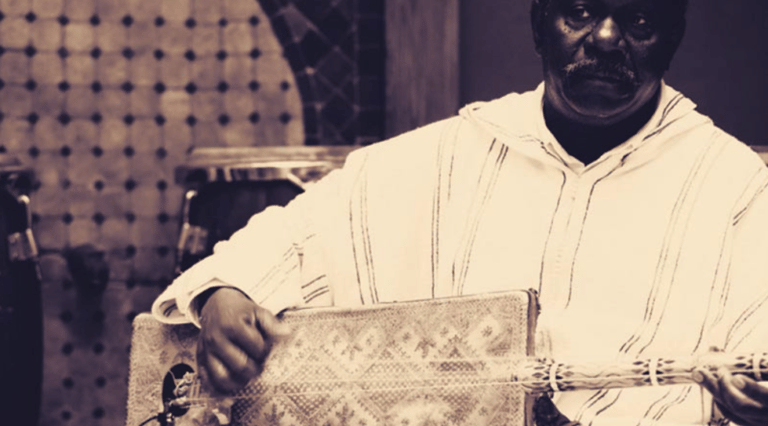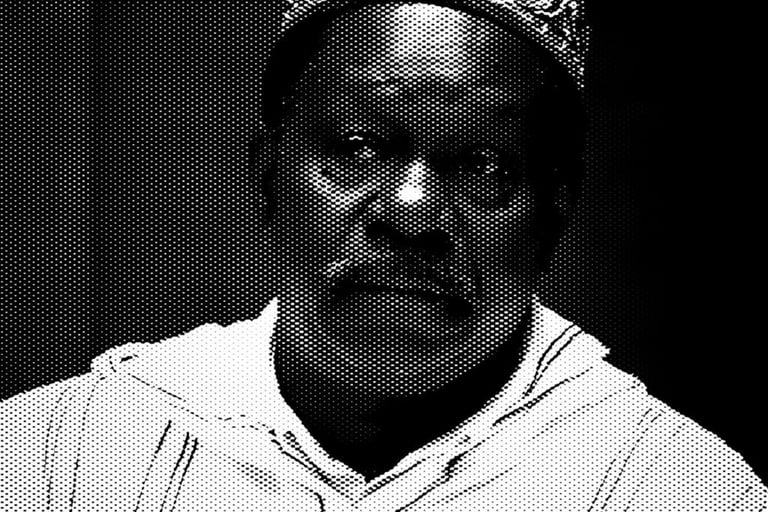Maâlem Mahmoud Guinia: The Soul of Essaouira and Global Ambassador of Gnawa Trance
Few artists embody the very soul of a city like Maâlem Mahmoud Guinia embodied Essaouira. For decades, his deep baritone voice and the telluric rhythms of his guembri were the soundtrack to the "City of Wind"—a sound both deeply rooted in centuries of history and projected toward the world. Guinia was more than a musician; he was the guardian of an ancient spiritual tradition, a silent king among his peers, and a pioneer who built a bridge between Morocco's sacred trance rituals and the global musical avant-garde.
The Sound of Essaouira: The 'Saouiri' Style
Mahmoud Guinia was the foremost master of the 'Saouiri' style—the specific Gnawa sound of his hometown. While technical differences between regional styles can be subtle, often passed down only through oral tradition, the sound of Essaouira is universally described with three words: pure, powerful, and uncompromising. This was not music crafted for entertainment; its higher purpose was to heal and to summon the trance.
His playing of the guembri was hypnotic, a pulsating bass that laid the very foundation for ritual chants and the relentless, metallic shimmer of the krakebs. His deep and resonant voice sought not embellishment, but truth, capable of steering the complex, hours-long nocturnal ceremonies—the Lila—from start to finish.
The Encounter That Changed Everything: "The Trance of Seven Colors"
For years, Guinia's fame was a Moroccan treasure, a profound secret known mostly to connoisseurs and devotees of authentic ritual music. That all changed in June 1994. Visionary producer and bassist Bill Laswell, captivated by this ancestral sound, traveled to Essaouira. With him was a true legend of spiritual jazz: saxophonist Pharoah Sanders.
Their goal was not a sterile studio session, but an authentic field recording. Magic was captured in Guinia's own home, surrounded by his family and musicians. The resulting album, "The Trance of Seven Colors", stands as a towering milestone in world music. Laswell's production was masterful, preserving the raw, unvarnished atmosphere of the performance. Pharoah Sanders' saxophone, lyrical and free, enters into a dialogue with Guinia's guembri not as an intruder, but as a kindred spirit. The title itself is a direct reference to the seven mluk (spirits) invoked during the Lila, each associated with a specific color, rhythm, and chant. The album became a global touchstone, opening the world's doors to Gnawa music in its purest and most potent form.
Beyond Borders: A Legacy of Musical Dialogue
"The Trance of Seven Colors" was only the beginning of Maâlem Mahmoud Guinia's international journey. His profound musicality and unwavering artistic integrity made him a sought-after collaborator for artists across wildly different genres. He was always ready to explore, yet never compromised the essence of his art.
Collaboration with Free Jazz
In 1997, the album "The Wels Concert" placed him on stage with two giants of radical improvisation: German saxophonist Peter Brötzmann and American drummer Hamid Drake. The result was a volcanic encounter, a torrent of energy where Guinia's shamanic trance collided and merged with the unbridled fury of free jazz, proving his rhythm could anchor even the most chaotic explorations.
Collaboration with Electronic Music
Decades later, in 2014, he proved his timeless relevance by collaborating with electronic music producers James Holden and Floating Points. The resulting EP, "Marhaba", born from a residency in Marrakech, saw his guembri and voice respectfully integrated with modular synths and electronic beats. This project culminated in a legendary Boiler Room session that introduced his sacred music to a new generation of fans worldwide.





An Immortal Legacy
Maâlem Mahmoud Guinia passed away in 2015, leaving an unfillable void. However, his legacy is more alive than ever. As is tradition, he passed his knowledge and his status to his successors. His brother, Maâlem Mokhtar Gania, and especially his son, Maâlem Houssam Guinia, now carry the torch. Houssam, in particular, after accompanying his father for years, is today an established master who, like him, honors the tradition while opening himself to new fusions.
Mahmoud Guinia was far more than a musician. He was a spiritual guide and a cultural ambassador who carried the deep, healing trance of Essaouira to the world stage, demonstrating that the most ancient music can speak a universal language without ever losing its own soul.
